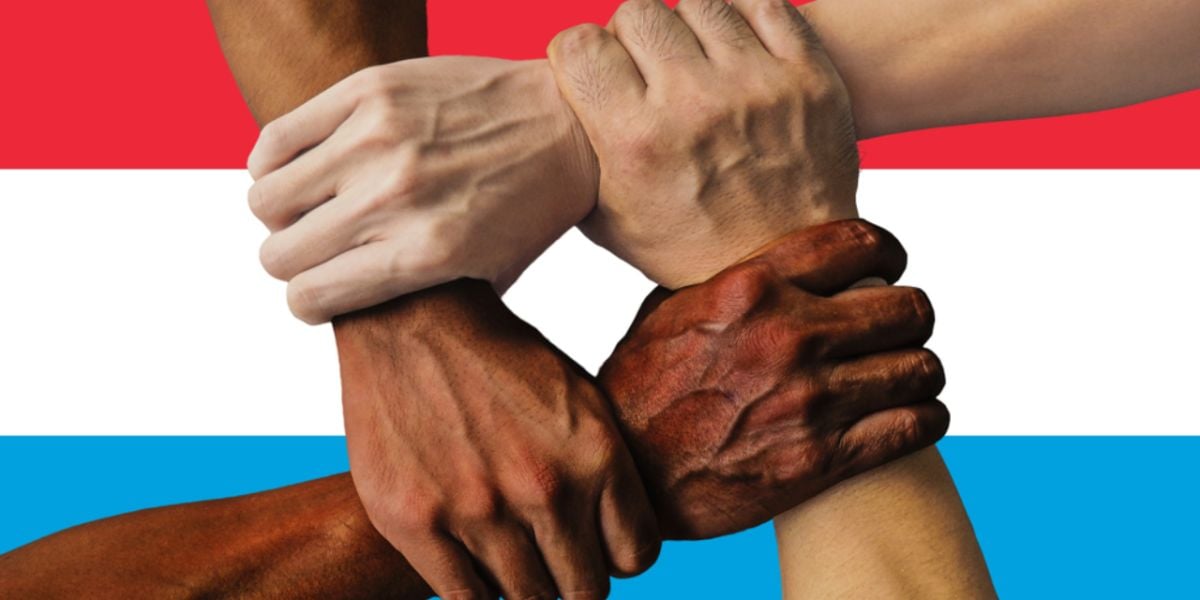
Located in the heart of Europe, the Grand Duchy of Luxembourg is a small country renowned for its cultural diversity and tolerance towards different communities. A popular destination for expatriates, it stands out for its environment that fosters harmonious coexistence among people from various backgrounds. In this article, we will explore the integration policies and associative structures that aim to promote diversity and inclusion for expatriates and residents alike.
Luxembourg stands out for its diverse population, with a rich ethnic and social representation. As a host country for many expatriates and immigrants, it brings together people from different parts of the world, making it a truly multicultural nation.
In 2023, 47.3% of Luxembourg's population consists of foreign residents originating from various countries in Europe and beyond. Among the most represented communities are Portuguese, French, German, Italian, Belgian, and British nationals, among others. This ethnic diversity significantly enriches the country's social fabric.
Luxembourg also showcases a wide socio-economic diversity. On the one hand, a prosperous middle class enjoys a high standard of living. On the other hand, socio-economic inequalities persist, as in most societies, with wealth and opportunities distributed unevenly across regions and social groups.
In terms of social integration, Luxembourg implements policies and structures aimed at fostering social cohesion and equal opportunities. Organizations such as the National Reception Office (ONA) and associations like ASTI (Association for the Support of Immigrant Workers) play a key role in welcoming and integrating newcomers.
It is essential to note that the social and ethnic situation evolves constantly, influenced by policies, migration flows, economic and social changes, and demographic dynamics. Therefore, it is important to consult up-to-date sources to obtain accurate information about Luxembourg's ethnic and social representation.
A welcoming environment in Luxembourg
Luxembourg is often considered one of the safest countries in the world, providing a welcoming and secure environment for all its residents, including expatriates. Tolerance and respect for human rights, which are core values of the country, contribute to creating an atmosphere where everyone can feel safe and valued.
The country also participates in the European initiative “Diversity Charter” and relies on a network of committed associations and institutions. For example, Luxembourg has a Ministry of Equality and Diversity (MEGA), whose role is specifically to implement actions that promote a fairer and more inclusive society. These actors play a key role in building a tolerant, equitable, and diversity-respecting Luxembourgish society. Their actions aim to raise awareness, combat discrimination, and promote social inclusion for all residents.
Safety for people from different ethnic backgrounds in Luxembourg
Luxembourg boasts a multicultural population, with individuals from various ethnic backgrounds living alongside each other. The promotion of harmonious coexistence is a priority, and efforts are made to address and prevent discrimination.
Organizations like the ASTI and the Centre de Liaison et d'Action des Associations d'Étrangers (CLAE) play a crucial role in integrating individuals from diverse ethnic backgrounds. These grassroots entities extend a warm welcome and provide support to expatriates and immigrants as they navigate the processes of social and professional integration.
ASTI, founded in 1982, is committed to enhancing the well-being of immigrant workers in Luxembourg and aiding their seamless social and professional integration. ASTI offers various services, including legal guidance, administrative assistance, and employment search support. The association also organizes workshops and training sessions to enhance the linguistic and vocational skills of migrants. The association also offers live translation services and is frequently present at events in Luxembourg. This allows everyone to follow a conference or presentation, regardless of the language spoken by the speaker.
CLAE, established in 1991, serves as a representative and supporter of foreign associations in Luxembourg. It provides a platform for foreign communities to participate in the nation's sociopolitical discussions, giving them a voice. CLAE actively works to advance the involvement of foreigners in Luxembourg's civic and political spheres, contributing to their social integration and a sense of belonging.
Caritas Luxembourg collaborates with ASTI to welcome and integrate refugees and asylum seekers in Luxembourg. The organization provides material, emotional, and administrative assistance to individuals facing vulnerability, helping them seamlessly integrate into Luxembourg's society.
LGBTQIA+ inclusivity in Luxembourg
Luxembourg is firmly committed to LGBTQ+ rights and has passed laws to promote inclusivity and equality for all, regardless of sexual orientation.
Rosa Lëtzebuerg, CIGALE and the CID | Fraen an Gender associations, dedicated to upholding the rights of LGBTQ+ individuals, play a crucial role in enhancing collaborative integration efforts in Luxembourg.
- Rosa Lëtzebuerg: Founded in 1996, this association advocates for the rights and well-being of LGBTQ+ individuals in Luxembourg. It engages in advocacy for equal rights, organizes cultural events such as Pride, and hosts gatherings for the LGBTQ+ community. The association provides a safe and welcoming space where members can meet and express themselves freely. It also plays an important role in raising public awareness about issues related to gender identity and sexual orientation. Rosa Lëtzebuerg is also home to the Rainbow Center, a hub for Queer culture.
- CIGALE: Established in 1991, CIGALE (Centre d'Information Gay et Lesbien) is an organization established to assist young LGBTQ individuals and their families. The association offers psychological and social assistance to young people who are exploring their gender identity or sexual orientation and their loved ones. Additionally, CIGALE conducts informative and awareness-raising sessions within schools and institutions to foster a culture of inclusivity and respect for sexual diversity.
- The CID | Fraen an Gender (Center for Information and Documentation on Women and Gender) is an organization dedicated to promoting gender equality and highlighting the contributions of women. This center plays a key role in raising awareness and educating the public on gender-related issues by offering a rich collection of resources and materials accessible through the association's library. The CID also regularly organizes events (workshops, conferences, debates, etc.) to educate the public on these topics and provide opportunities for engaged citizens to connect.
- Cellule Anti-Discrimination LGBTI (CAD LGBTI): Collaborating with CIGALE, CAD LGBTI actively combats discrimination based on sexual orientation and gender identity within Luxembourg. The organization informs those who have experienced discrimination about their rights and offers guidance through legal procedures.
- E-learning Course for Better LGBTQ+ Inclusion in the Workplace: This online course, developed by several local associations in collaboration with the Luxembourg government and with the support of the European Union, aims to provide a better understanding of the issues related to this topic and to combat discrimination against LGBTQ+ individuals in the professional environment.
Inclusivity for people with disabilities in Luxembourg
Luxembourg is dedicated to ensuring equal opportunities for individuals with disabilities, actively working to implement initiatives that foster their seamless integration into both social and professional spheres.
Organizations such as the HMC League and INFPC are essential in promoting the inclusion of people with disabilities.
- Ligue HMC (Handicap Mental et Cérébral): Established in 1947, Ligue HMC is a dedicated group that provides valuable support and guidance to individuals with mental or cerebral disabilities and their families. Their mission is to facilitate the inclusion of individuals with disabilities in both social and professional settings. Ligue HMC also organizes leisure and educational events designed to promote autonomy and personal growth.
- INFPC (Institut National pour le Développement de la Formation Professionnelle Continue): The INFPC focuses on advancing ongoing vocational training in Luxembourg. It offers specialized training programs tailored to the unique needs of individuals with disabilities to enhance their skills and employment prospects. These programs are crucial in promoting professional inclusion and addressing various forms of discrimination related to disabilities.
- ADEM (Agence pour le Développement de l'Emploi): ADEM, in collaboration with INFPC, provides targeted support services for job seekers with disabilities. Through this partnership, the agency works to integrate these individuals into the workforce seamlessly and actively works to remove barriers to employment.
Luxembourg has a significant integration policy for people with disabilities. For example, the accessibility of transportation and public spaces is highly developed, and many stores provide wheelchairs (both manual and electric) free of charge to facilitate mobility for elderly individuals or those with invisible disabilities, among others.
For individuals with severe disabilities, the country has implemented the Adapto initiative, a transportation system exclusively reserved for them to travel across the country. Additionally, many municipalities also offer free shuttles that pick up residents directly from their homes and drop them off wherever they need to go within the municipality.
Through initiatives like Info-handicap and its Ministry for Family Affairs, Solidarity, Living Together and Reception of Refugees (MiFa), Luxembourg demonstrates a clear objective: to put everything in place to promote the independence of people with disabilities.
The disability allowance provided by the government is one of the highest in Europe, although it unfortunately remains below the Luxembourg minimum wage. This allowance is paid directly to the person with a disability, regardless of their partner's income.
Integration policies in Luxembourg
Luxembourg places significant emphasis on integrating expatriates and immigrants, recognizing their valuable contributions to the community. The nation is actively committed to integration strategies to create an inclusive environment for all residents, whether expatriates or native Luxembourgers. These policies are designed to facilitate welcoming, integrating, and involving every individual within Luxembourg society.
Integration structures in Luxembourg:
- ONA: ONA plays a crucial role in coordinating the reception and assimilation of foreigners in Luxembourg. This office offers practical guidance on administrative procedures, as well as the rights and responsibilities of foreign residents. ONA also provides language classes and integration initiatives to help newcomers become a part of Luxembourg society.
- ADEM: ADEM also plays a pivotal role in assisting the professional integration of expatriates in Luxembourg. The agency provides guidance on job hunting, offers vocational training tailored to the demands of the local labor market, and provides personalized assistance to facilitate the seamless integration of newcomers into their professional roles.
Organizations promoting tolerance and non-discrimination in Luxembourg
- Center for Equal Treatment (CET): An independent entity dedicated to advancing equal treatment and combating various forms of discrimination based on race, ethnicity, religion, age, gender, sexual orientation, and disability. CET provides legal assistance to those who have experienced discrimination and helps them assert their rights. The organization also plays a crucial role in increasing public awareness of diversity and inclusiveness.
- Mamie et Moi: This intergenerational organization fights social isolation and prejudice by bringing young and elderly individuals together in collaborative projects. It promotes intercultural and intergenerational interactions, contributing to enhanced social cohesion.
- Inter-Actions: Dedicated to fostering cultural diversity and promoting social inclusion by facilitating exchanges and conversations among the various communities in Luxembourg. The organization arranges cultural events, conferences, and workshops to promote mutual understanding.
- Lifelong Learning Center: This center offers numerous training programs aimed at promoting the integration of minorities and diversity in the workplace.
- National Women's Center of Luxembourg (CNFL): This organization brings together institutions and partners working in the field of equality between women and men.
- Ministry of Family Affairs, Solidarity, Living together and Reception of Refugees : This ministry implements numerous initiatives to promote the integration of immigrants, refugees, as well as workplace diversity, particularly for people with disabilities or transgender individuals, among others.
- Ministry of Gender Equality and Diversity (MEGA): This ministry is particularly committed to building a fairer and more inclusive society for everyone, regardless of sex, gender identity, sexual orientation, or sex characteristics.
Commitment to integration in Luxembourg: A holistic approach
In Luxembourg, integration is seen as a holistic endeavor that engages all aspects of society. Authorities collaborate with organizations and associations to promote diversity, mutual respect, and equal opportunities. The nation's integration policies aim to ensure that every resident, regardless of their background, abilities, or sexual orientation, can thrive and make meaningful contributions to Luxembourg's vibrant community.
In summary, the growing collaboration among associations and organizations in Luxembourg underscores the nation's unwavering commitment to embracing diversity and promoting inclusiveness. Through these partnerships, an inclusive community is nurtured, where every individual, regardless of their background, disability, or sexual orientation, can genuinely thrive. Luxembourg is establishing itself as a model of harmonious coexistence where diversity is acknowledged and celebrated.
Indeed, Luxembourg, situated at the crossroads of three borders, stands out for its dedication to fostering diversity and inclusiveness in a secure and welcoming environment for expatriates. Through integration policies and specialized community frameworks, there is active support for the harmonious coexistence of individuals from diverse cultural and social backgrounds.
As a sought-after expatriate destination, Luxembourg offers a high quality of life, promotes intercultural interactions, and values each person's unique contributions to a diverse and compassionate community. Expatriates and local residents can find comfort and thrive in this haven of tranquility, where diversity is acknowledged and embraced.
We do our best to provide accurate and up to date information. However, if you have noticed any inaccuracies in this article, please let us know in the comments section below.








